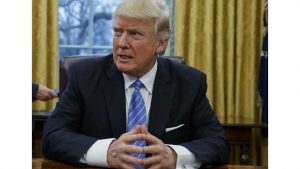 WASHINGTON, United States (AFP) — President Donald Trump put off a final decision on strikes against Syria following a crunch meeting with national security advisors yesterday, as Moscow warned against any US move that could trigger a conflict between the nuclear-armed rivals.
WASHINGTON, United States (AFP) — President Donald Trump put off a final decision on strikes against Syria following a crunch meeting with national security advisors yesterday, as Moscow warned against any US move that could trigger a conflict between the nuclear-armed rivals.
Minutes after Pentagon brass and Cabinet members jumped in black armoured SUVs and sped away from the White House, Press Secretary Sarah Sanders said Trump would continue to assess intelligence and engage with allies.
“No final decision has been made,” she said, adding that Trump would confer later in the day with French President Emmanuel Macron and British Prime Minister Theresa May.
The military drumbeat appeared to reach crescendo ahead of the meeting, with US action seeming imminent as Russia stonewalled diplomatic efforts at the United Nations and France cited “proof” that Moscow’s Syrian ally carried out a deadly chemical weapons attack.
Western officials believe chlorine was used in a Saturday attack on Douma, the main city in the long-time rebel bastion of Eastern Ghouta, where the British Government now estimates 75 people were killed, and that Bashar Al-Assad’s regime was responsible.
What is less clear is whether sarin or a sarin-like agent was also used.
During the West Wing sitdown, Defence Secretary James Mattis and the Chairman of the Joint Chiefs of Staff Joe Dunford were expected to lay out options for retaliatory strikes against the Syrian regime.
But after a week in which Trump has burst through an almost daily series of self-imposed decision deadlines, he again appeared unwilling to rush headlong to war.
Just hours earlier Trump had vowed to make his choice “fairly soon”.
“We’re having a number of meetings today, we’ll see what happens, we’re obviously looking at that very closely,” he told lawmakers and governors in the Cabinet Room.
His window for military action could be narrowing, with inspectors from the Organisation for the Prohibition of Chemical Weapons expected to arrive in Syria to begin work on Saturday, following an invitation from Damascus.
Diplomats have expressed concern that those experts could be used as hostages or human shields.
Since Saturday, when images of ashen toddlers struggling for breath emerged there has been a sustained military build-up in the eastern Mediterranean.
A French frigate, UK Royal Navy submarines laden with cruise missiles and the USS Donald Cook, an American destroyer equipped with Tomahawk land attack missiles, have all moved into range of Syria’s sun-bleached coast.
The Cook has past experience tangling with the Russian military, having been deployed to the Black Sea during the recent crisis in Crimea.
In New York, Russia’s UN ambassador warned the priority in Syria was to avert US-led strikes that could lead to a confrontation between the world’s two pre-eminent nuclear powers.
“The immediate priority is to avert the danger of war,” said Ambassador Vassily Nebenzia following closed-door Security Council talks, refusing to exclude the possibility of US-Russian clashes.
Trump has slammed Russia for its partnership with “Gas Killing Animal” Assad, spurring concerns that a US strike could lead to a conflagration with Russia, which has major military facilities at Tartus and Khmeimim and works cheek-by-jowl with Syria forces that could be targeted.
US officials have refused to rule out direct military engagement with Russia, with the White House saying “all options are on the table”.
But a special hotline for the US and Russian militaries to communicate about operations in Syria is active and being used by both sides, Moscow said yesterday.
On the ground in Syria, rebels in Eastern Ghouta surrendered their heavy weapons and their leader left the enclave, signalling the end of one of the bloodiest assaults of the seven-year war and a major win for the Assad regime.
A top leader of Jaish al-Islam, a group which controlled Douma for years, told AFP it was Saturday’s attack that forced them to accept a Russian-brokered deal and evacuate.
At the United Nations meanwhile, diplomats were mulling a draft resolution put forward by Sweden and obtained by AFP, that would dispatch a “high-level disarmament mission” to rid the country of chemical weapons “once and for all”.
That may prove too little, too late.
The UN Security Council, tasked with maintaining international peace and security, has been riven, with Moscow virulently denying the Douma attack took place, or postulating that it was carried out by rebels.
The council, which has been deadlocked throughout the Syrian civil war, has already failed to agree on a response in three votes.
In Paris, Macron upped the pressure on Moscow by stating he had “proof” that Assad’s regime had used chemical weapons, and vowing a response “at a time of our choosing”.
In London, May’s Cabinet agreed in an emergency meeting “on the need to take action” against the Syrian regime.
But across Western capitals opposition to military action also grew. US lawmakers questioned whether Trump has the legal authority to order strikes without Congressional approval and opposition parties voiced concern.
National security experts worried whether strikes would actually serve to deter Assad.
In April last year Trump ordered Tomahawk strikes on the Shayrat Airbase in response to a chemical weapons attack on rebel-held Khan Sheikhun.
